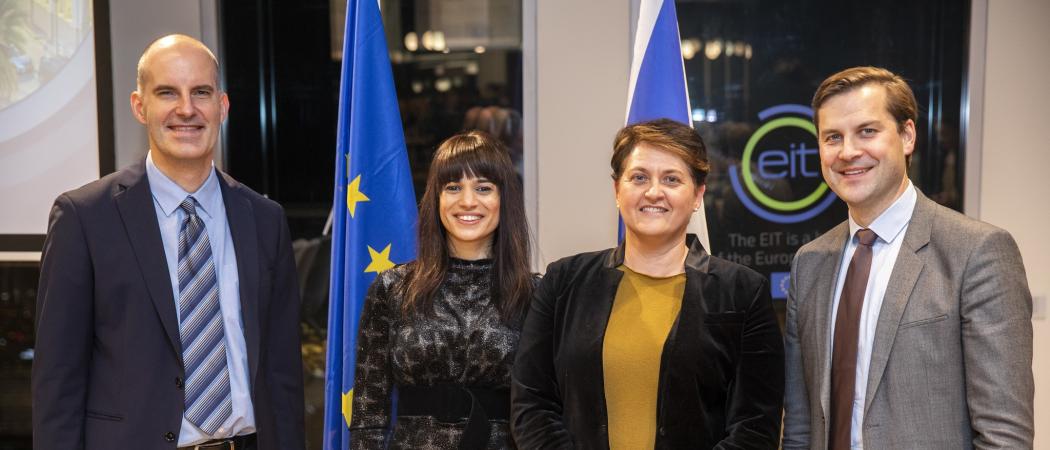Head of European Institute of Innovation and Technology’s new Tel Aviv office wants Europeans and Israelis to get to know each other a little better

Adi Barel (centre-left) is leading the EIT's Israel base in Tel Aviv. Photo: EIT
The head of the European Institute of Innovation and Technology’s (EIT) new Tel Aviv base says her goal is to better connect Europeans with their high tech neighbour.
Adi Barel, who previously managed the EIT’s outreach programme to Tel Aviv, runs the new office at the city's Azrieli Sarona Tower. It is the EIT's second base outside the continent, following the launch of a similar hub in Silicon Valley.
Barel will expand the EIT’s presence and activities in a country recognised for its considerable success in developing start-up companies, while giving Israelis a better view of a neighbour she says it still doesn’t know too well.
“Many Israeli companies don’t know where to start with European markets. We’re a country that’s more aligned with the US,” Barel said. “So we’re here to help explain and build on the relationship with Europe,” she told Science|Business.
The outfit is small – a team of two, with an annual budget of €700,000. “But we’re in a central location, we have a lot of key relationships, meaning we have a lot to offer,” Barel said.
With its large pools of investment capital, Tel Aviv offers funding opportunities for EIT-backed companies.
“It’s an obvious choice for an office – a superb innovation power and Europe’s East Coast tech neighbour,” said Jan-Philipp Beck, CEO of EIT Health, one of eight EIT innovation hubs.
Beck says the new “sort-of EIT embassy” will allow the EIT to “better advertise” itself and Europe’s investment potential.
“Investors sometimes perceive Europe as fragmented; not one coherent space,” Beck said. “We can play a role in helping them navigate it, saving everyone time.”
The new office, officially launched last December, sees the EIT reaching for a higher global profile.
From its headquarters in Budapest, the EIT operates Knowledge and Innovation Communities (KICs) involving academic and industry collaborations. EIT Health is one of eight KICs; others focus on themes ranging from food to manufacturing, climate to urban mobility. The EIT has supported over 2,000 companies since 2008, which have raised some €1.5 billion in external capital.
EIT will face competition from the EU’s newest tech agency, the European Innovation Council (EIC), in the coming years.
Set up by the previous EU research commissioner Carlos Moedas, the EIC is expected to provide some of the same services, such as funding, mentoring and investor matchmaking, offered by EIT.
One way for EIT to distinguish itself is by growing outwards. “Our engagement abroad has to be agile,” said Beck. “Individual KICs like us will take the lead – it’s a less cumbersome way of doing it. The Israel hub is there to create connections for all of the other KICs too.”
The new Israel base may also offset some of the risk of Brexit, with the EIT bracing for the outcome of talks between Brussels and London this year that will decide the future trade relationship.
The EIT has four hubs involving 117 companies and universities in the UK. Between 2014 and 2018, the EIT awarded grants worth €95 million for research in the country, €20 million in 2018 alone.
“It would be an enormous setback to lose the UK,” said Beck. “The connection is really important for us – we’ll do what we can to keep this together. It would be a lie to say we won’t be impacted by this decision.”
For Israel, the new EIT presence chimes with the country’s goal to go further into the EU research fold.
Israel is an associate member of the Horizon 2020 research programme, and wants to retain this status for the 2021-2027 Horizon Europe programme.
In March, the country will hold a third general election in less than a year, with the prime minister, Benjamin Netanyahu, in a fight for his political survival.
Whatever the outcome, the results won’t change Israel’s outlook on Europe, Barel said.
“I guess the election result doesn’t matter really. All the candidates understand the importance of collaboration with the world, including Europe. I don’t think that’s going to change,” she said.





 A unique international forum for public research organisations and companies to connect their external engagement with strategic interests around their R&D system.
A unique international forum for public research organisations and companies to connect their external engagement with strategic interests around their R&D system.